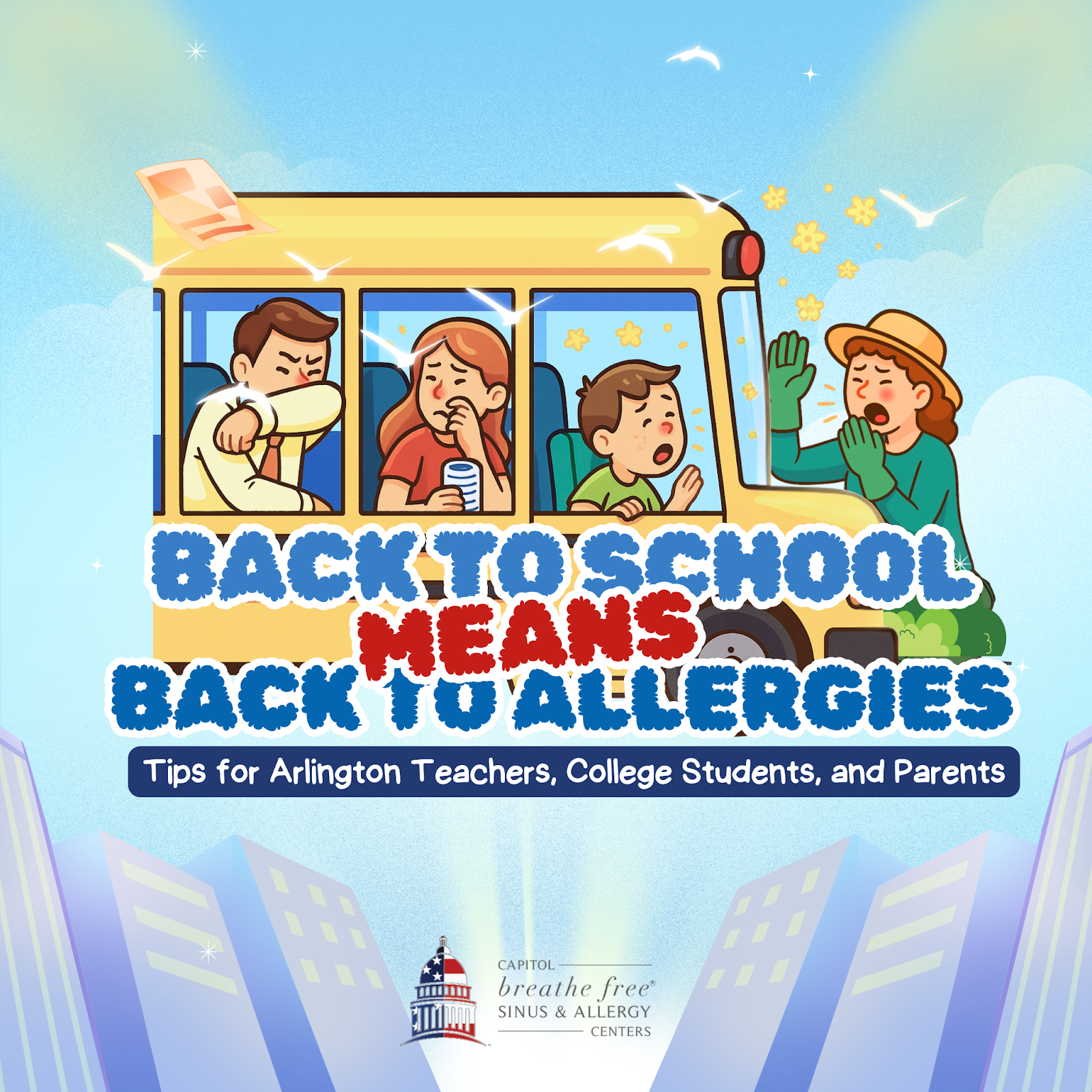Back-to-School Means Back to Allergies: Tips for Arlington Teachers, College Students, and Parents
It’s that time of year again — new school supplies, early mornings, and… allergy flare-ups. For many Arlington families, going back to school also means going back to sneezing, runny noses, and itchy eyes. Whether you’re a parent, a teacher, or a college student, allergies can make the busy school season even tougher.
At Capitol Breathe Free, we understand how frustrating it is to juggle school, work, and family life while managing allergy symptoms. Here’s what you need to know — and some practical tips to help your whole family stay healthier this school year.

Why Do Allergies Get Worse During the School Year?
When students head back to school, they spend more time indoors — in classrooms, dorms, or gyms — where dust, mold, and other allergens often build up. On top of that, fall pollen like ragweed can trigger symptoms for people with seasonal allergies.
Teachers are surrounded by dozens of students, and parents are managing busy homes filled with backpacks, sports gear, and more opportunities for allergens to sneak inside. College students in dorms or off-campus housing often deal with dust and poor air circulation, which can make things worse.
If you’ve been searching for family allergy care in Arlington, you’re not alone.
Allergy Tips for Arlington Families
Allergies may be common, but that doesn’t mean your family has to suffer all season long. Try these simple tips to help manage allergy triggers at home, in the classroom, and on campus.
- Keep Allergens Out of the House
Encourage everyone in your family to leave shoes at the door and change clothes after school or work. This helps keep pollen and dust from spreading indoors. Don’t forget to wipe down backpacks and gym bags, too.
- Stay on Top of Cleaning
Dust mites and mold thrive in carpets, bedding, and soft furniture. Washing sheets and pillowcases weekly in hot water can help. Vacuuming with a HEPA filter is also a good idea — especially if you’ve got pets bringing in extra allergens.
- Manage Classroom and Dorm Allergens
Teachers can ask for better air filters in classrooms or open windows when possible. College students should check dorm rooms for signs of mold or dampness and clean regularly. Using a small air purifier can also help improve indoor air quality.
- Know When It’s More Than “Just Allergies”
If your child or teen struggles with breathing, constant sinus infections, or has symptoms that don’t improve with over-the-counter meds, it may be time to see an ENT in Arlington. An ENT (ear, nose, and throat doctor) can evaluate whether underlying sinus or structural issues may be contributing to allergy-like symptoms.
- Get a Plan That Works for the Whole Family
Every family is different — what works for your neighbor’s child might not work for yours. Talk with a healthcare provider about an allergy plan that fits your family’s needs. This might include medications, allergy testing, or treatments that help reduce reactions over time.
Don’t Let Allergies Take Over the School Year
Allergies don’t have to rule your family’s routine. With the right steps and support from local professionals, you can cut down on symptoms and keep your focus on what really matters — school, work, and family life.
If you’re looking for lasting support for allergy management for your family in Arlington, Capitol Breathe Free is here to help. Our team can check for underlying issues, recommend treatment options, and help you breathe easier and manage symptoms more effectively throughout the year.
The information provided in this article is for informational and educational purposes only and does not constitute medical advice. It is not intended to diagnose, treat, cure, or prevent any disease or medical condition. Always seek the guidance of your physician or other qualified healthcare provider with any questions you may have regarding a medical condition or treatment.
Results may vary: Treatment outcomes and health experiences may differ based on individual medical history, condition severity, and response to care.
Emergency Notice: If you are experiencing a medical emergency, call 911 or seek immediate medical attention.

.png)
.png)